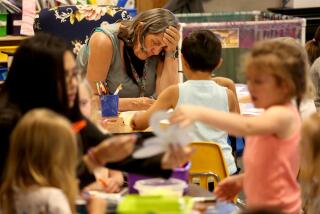Warm American Welcome for Visiting Russia Educator : Thousand Oaks: Maya B. Pildes, principal of the year in her homeland, tours two schools in the Conejo Valley Unified School District.
- Share via
Maya B. Pildes patted her heart to indicate nervousness as she headed into a Thousand Oaks class Tuesday morning, even though the kindergartners inside were unaware their guest was Russia’s principal of the year for 1992.
Three class visits later, any hint of tentativeness was gone as Pildes scrolled down a hanging wall map before a class of second-graders at Park Oaks Elementary School to point out her hometown of St. Petersburg.
“You are very welcome to come visit me,” Pildes said through a translator. “We can be good friends, because we need a good peace in the world.”
The youngsters were told they would need a warm coat and umbrella to visit Pildes. They learned that children in Russia go to school six days a week.
“Who wants to go to Russia?” translator Vera Chernin asked. All hands shot up.
“Oooohhh,” Pildes responded delightedly.
Sponsored by the Russian government, Pildes, 42, toured two schools in the Conejo Valley Unified School District on the final leg of a two-week U.S. fact-finding trip that included visits to private schools in Tampa, Fla.
Despite the differences she discovered, Pildes noted many similarities, Chernin said.
“Kids are kids everywhere. Schools are schools. What is different? The language,” Pildes said.
Political reforms in Russia have reached the classroom, she told a group of district officials who welcomed her arrival, including school board member Dorothy Beaubien and Supt. Jerry Gross.
“It’s opening doors for creativity now,” Pildes said.
Limited resources are allocated based on a merit system, she said. That includes money for equipment and teacher raises, which is doled out according to classroom innovation and student performance, she said.
“If you need extra money, it goes to who deserves this,” Pildes said. “(Teachers) can make their salaries double now.”
Already, Pildes has helped the 147 teachers at her school to adopt some reforms patterned after shifts in U.S. educational theories, many of which she learned about through correspondence in recent years with educators such as Park Oaks Principal Rachelle Morga.
For example, teachers in different subject areas work together to thread common themes across studies from biology to English and social science, Pildes said.
“It is most important now that I can see what I have heard about,” Pildes said.
Challenged by Morga to rate Russian schools in relation to American ones, Pildes favored her native system because it stresses basic academics and leads to higher achievement, she said.
But Morga said Pildes’ perceptions could be skewed because she sees only the top-level students at her school. After the eighth grade, Russian students are channeled into either a college-bound high school, a less challenging high school or a trade school, Pildes said.
Pildes said she was shocked but impressed by several small classes she toured at Park Oaks for students with learning disabilities, speech problems and low test scores.
“She’s very impressed with the idea to work with children in remedial programs that are not succeeding,” Chernin said. “To have extra money to hire extra teachers is absolutely unbelievable.”
Because of her success at the helm of a 1,300-student school for grades one through 11, Pildes runs among the most technologically modern schools in Russia with a television and videocassette recorder in every room, she said.
In 1995, Pildes will open a new, better equipped version of the school known only as No. 56. She said her love of teaching makes her a good principal.
“She loves her job--not likes--she loves her job,” Chernin said. “She thinks she cannot do anything else.”
Pildes and Chernin, who lives in Northridge since emigrating to the United States 15 years ago, have been friends since childhood. Chernin said she asked Pildes to come with her when she left, but Pildes refused.
“She said to me: ‘My classroom, it’s my stage. I don’t work, I perform. In America, I can’t do that anymore,’ ” Chernin said.
More to Read
Sign up for Essential California
The most important California stories and recommendations in your inbox every morning.
You may occasionally receive promotional content from the Los Angeles Times.












